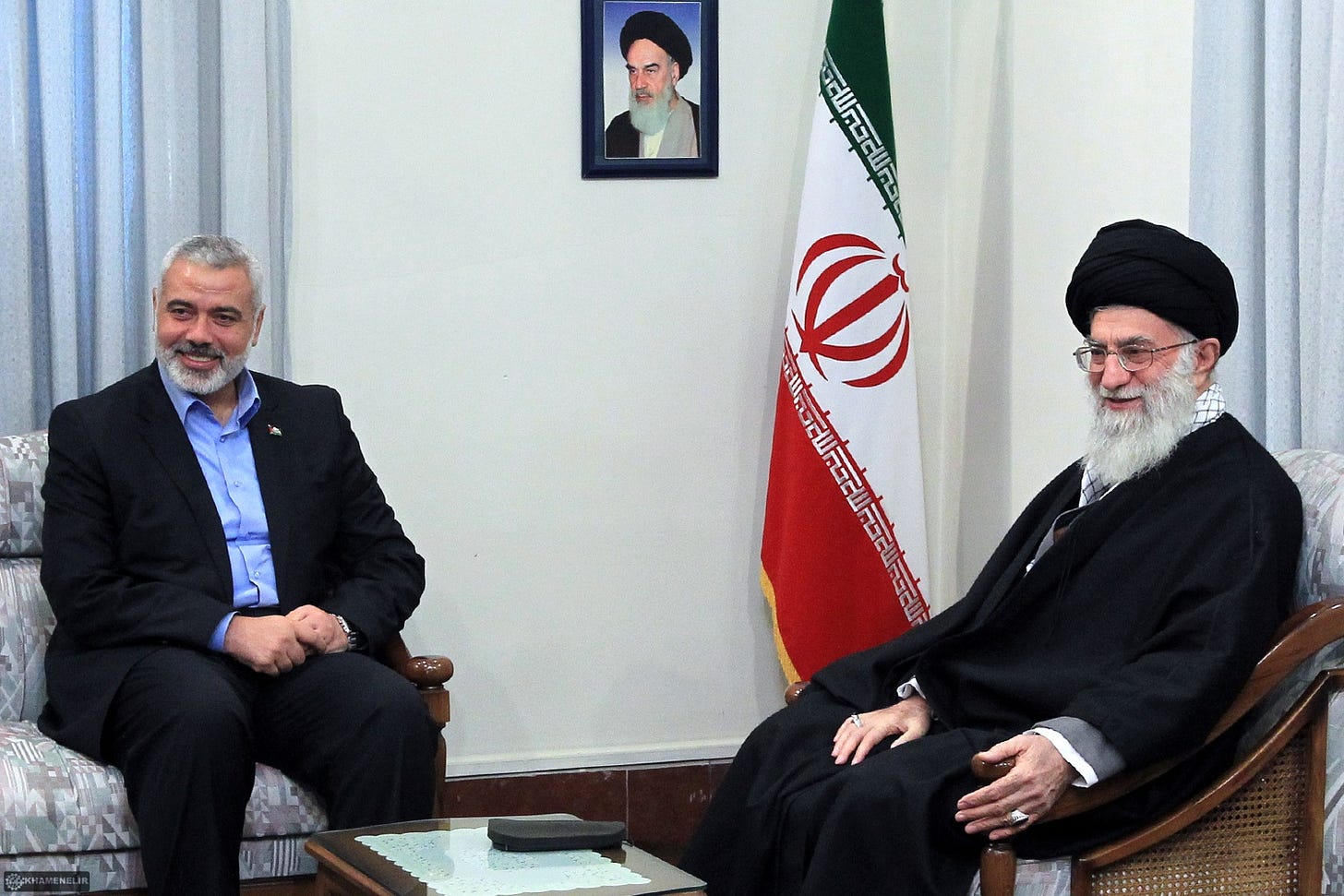Israel just made it clear that it is ready for all-out war.
"Gold medal for Israel."
Please consider supporting our mission to help everyone better understand and become smarter about the Jewish world. A gift of any amount helps keep our platform free of advertising and accessible to all.
You can also listen to the podcast version of this essay on Apple Podcasts, YouTube Music, YouTube, and Spotify.
The two high-profile Israeli assassinations in the last 48 hours, one in the Lebanese capital and the other in Tehran, are a direct challenge to the unhinged Islamic Republic of Iran.
The Israel Defense Forces struck a building in southern Beirut on Tuesday evening, killing Fuad Shukr, the Hezbollah terror group’s most senior military commander, who Israel said was responsible for Saturday’s deadly rocket attack in northern Israel that killed 12 children.
Then, in the early morning Wednesday, Israel time, Hamas political leader Ismail Haniyeh was assassinated while visiting Iran for the country’s inauguration of its new president after the previous one died in a helicopter accident a few weeks ago.
In recent days, Israel has also killed Hamas military leader Muhammad Deif in Gaza and lit up the Hodeida port in Yemen.
Yet, with all of these successful actions, Israel is looking straight down the barrel at Iran and pushing it to decide whether they face a direct full-scale war with Israel, or gradually calm the situation.
The Israeli security establishment and the intelligence community — the Mossad, the Military Intelligence Directorate, and the Air Force — are entitled, if Israel is indeed behind the elimination of Haniyeh, to register a remarkable military and intelligence achievement for themselves in both assassinations — but that is beside the point.
The main point is that the State of Israel effectively told Iran and its proxies that if they do not cease and desist, Israel will not hesitate to go to an all-out war not only with Hezbollah, Hamas, and the Houthis in Yemen, but also with the head of the snake that sits in Tehran.
This means that Israel also has to prepare for a major war. In such a scenario, the home front will be the main front, and it will be subject to missile attacks of all kinds, along with explosive drones, which will be launched not only from Lebanon and Yemen, but also from Iran.
The Islamic Republic would likely rally armed Shia militias from Iran, Iraq, and Syria for the campaign, and even the Yemen-based Houthis could be transferred to Syria or join Hezbollah in Lebanon in attempts to carry out raids on Israel’s northern border.
Before they decided to act in Beirut and possibly also in Tehran, Israeli leadership knew very well that this could be the straw that breaks the camel’s back, leading to the deterioration of a regional war. They understood that it was actually a gamble, because it is truly uncertain if Iran currently wants a regional war that would complicate it with the United States.
The Iranians assume, rightly, that before the assassination of Fuad Shukr — a right-hand man to Hezbollah leader Hassan Nasrallah — Israel consulted with the United States. They assume that Washington approved this assassination, at least in part because Shukr was to some extent responsible for the 1983 Beirut barracks bombings which resulted in 307 killed people, including 241 American and 58 French military personnel.
But whether the U.S. approved of Ismail Haniyeh’s assassination — for which Israel has not officially taken responsibility — is an entire different story. For years, the Democrats, such as Obama and now Biden, have appeased this Iranian regime in all likelihood to avoid a military confrontation with Iran and its proxies across the Middle East.
Thus, green-lighting an assassination in the Iranian capital would seem unlikely on the surface. But after Saturday’s deadly rocket attack from Hezbollah left 12 children dead in northern Israel, the Jewish state regained much-needed leverage against the U.S. which was said to be leading a diplomatic dash to deter Israel from striking Lebanon’s capital Beirut or major civil infrastructure in response.
As such, Israeli leadership probably settled a deal with the U.S. in which they could attempt to assassinate Fuad Shukr and Ismail Haniyeh, both of which all parties knew would have serious repercussions for any momentum gained in long-held ceasefire and hostage deal negotiations between Israel and Hamas.
In return for approving these assassination attempts, the U.S. plausibly asked Israel to be more flexible in ceasefire and hostage deal negotiations, especially after it has been rumored that Prime Minister Benjamin Netanyahu hardened Israel’s stance in the negotiations.
Plus, the assassination of Haniyeh in Tehran is not expected to have a significant effect on Hamas in general and its other leader, Yahya Sinwar, in particular. Haniyeh was a political opponent of Sinwar and the two did not see eye-to-eye on Gazan issues that arose since October 7th.
Welcome to the politics of war.
Back in Iran, their regime is facing a significant dilemma at the moment. Should they respond to an attack on their soil, either themselves or via their proxies, or should they take the attack on their chin and move on?
It seems that the Iranians do not want a regional war at the moment, or even a geographically limited “hot” war with Israel. They prefer that such a war take place when Iran has operational nuclear weapons in hand, so that it and its proxies can enjoy immunity like North Korea, which taunts the U.S. and its neighbor South Korea.
Iran knows that when it has nuclear weapons, the U.S. will not be in a hurry to come to Israel’s aid. As it stands, Iran is a threshold nuclear state because it can produce fissile material for at least one bomb within a seven-to-10 days from enriched uranium. But the nuclear explosive device and another one that can be mounted on a missile will not be available for at least 12-to-18 months.
Therefore, the timing now for a major war — in which Iran will come to the aid of its proxies and confront Israel directly — is not favorable for Tehran. The Iranians prefer that the Houthis and Hezbollah continue to hit Israel and exhaust it.
The situation as it was until yesterday’s assassination in Tehran was ideal for Iran, because it is exhausting Israel and creating internal political rifts, while tens of thousands of Israeli residents are refugees in their own country, and the border towns are being destroyed.
In this situation, Israel’s legitimacy to fight (i.e. what is left of it) evaporates. In the eyes of the Iranians, Israel is slowly slipping into a state of collapse, like the Iranians have always wanted to see it.
Thus, the challenge in front of Iranian Supreme Leader Ali Khamenei is whether to pick up the gauntlet that Israel threw down and go to war against it — when Israel is at the peak of its intelligence and military capabilities — or decide to take a step back and settle for a measured and limited response to the humiliation of the elimination of Haniyeh within Iranian borders.
From Iran’s point of view, the assassination of the Hamas leader in the midst of the inauguration celebrations for the new Iranian president is a humiliation for the regime and proof that it is permeable and weak. This is one of the things that scares Iranian leadership the most — that the regime’s internal haters, and there are many of them, will recognize such weakness and rebel.
On the other hand, if Iran decides to attack Israel and the action does not achieve its goals, this will further cement the Iranian regime’s weakness.
And such a dilemma is exactly what Israel aspires to produce for Iran. After all, Haniyeh visited many countries in recent months as part of Hamas’ political efforts to end the war. He visited the President of Turkey Recep Tayyip Erdogan in Istanbul, as well as Cairo, and he resides permanently in Doha, the capital of Qatar.
Even so, Israel chose to eliminate him precisely in Tehran, where he arrived on the occasion of the inauguration of the Iran’s president, in a move that was perceived as an international humiliation for its murderous regime.
From Israel’s standpoint, they killed two birds with one stone: harming Hamas, and sending a brutal message to Tehran that it is not immune from paying a heavy price at home for supporting terrorist organizations. It can also be perceived as a message to Erdogan, who recently hosted Hamas members for a high-profile summit and just this week threatened Israel militarily.
The elimination of Haniyeh in Tehran is also a reminder to Iran of how much intelligence penetration Israel has, and how long Israel’s arm is when it so chooses. Iran’s outgoing Minister of Intelligence, Ismail Khatib, even said just last week, six days before the assassination of Haniyeh, that “the greatest achievement of my tenure is dismantling the infiltration network of the Mossad in Iran.”
Now his statement has become an object of ridicule among the Iranian regime’s opponents, and Haniyeh’s elimination joined a long line of actions attributed to Israel in the heart of the Islamic Republic.
As the Executive Editor of Commentary magazine, Abe Greenwald, put it: “Gold medal for Israel.”1
Abe Greenwald on X




Great piece! America needs to show strength instead of weakness in its support for Israel as it fights an existential war. We cannot wait for Iran to have nuclear capability before bringing them to their knees. Israel is in a fight for its life and I pray the leaders are guided in making the right decisions.
Wonderful piece! You carried through this incredible operation! You have shown incredible strength ! I believe you have shown the US’s weakness in their support. This is Israel as it should always be.